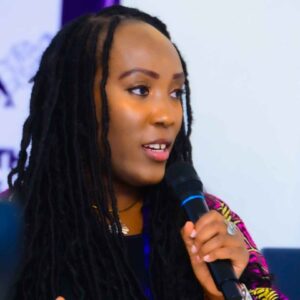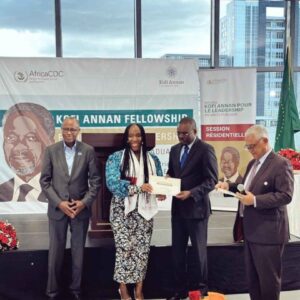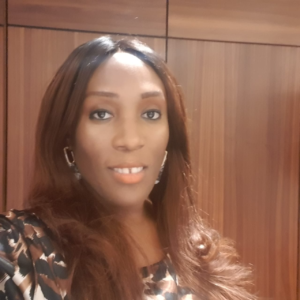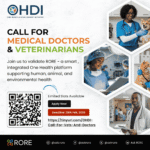
We are excited to announce Pharm. Estelle Mbadiwe as our One Health Personality of the Month for June 2024!
Pharm. Mbadiwe is a co-founder of Ducit Blue Solutions, a healthcare consulting firm dedicated to improving patient safety and quality in the health sector. She has played a pivotal role in empowering future public health leaders to tackle antimicrobial resistance, a critical One Health challenge, through internship and mentorship programmes involving participants from various One Health sectors. In this exclusive interview with OHDI, Pharm. Estelle shares her exciting journey in antimicrobial resistance advocacy, as well as the significant impact of her work.
Hello Pharm. Estelle, thank you for being our One Health Personality of the Month.
Please introduce yourself to us, telling us about your profession, educational background, including your past and current experiences in relation to One Health.
My name is Estelle Mbadiwe, I am the Founding Partner of Ducit Blue Solutions. I have a Master’s in Pharmacy, as well as a Master’s in Health Policy, Planning, and Financing, which is a joint program with the London School of Hygiene and Tropical Medicine and the London School of Economics. My experience in One Health began at my first job as a Pharmacist at St. Mary’s Hospital in Paddington, London, where Alexander Fleming discovered penicillin. This was my first insight into antimicrobial resistance. Seeing patients with antimicrobial-resistant infections made me realise the severity of the issue. Returning to Nigeria, I founded Ducit Blue Solutions, and we were the primary consultancy firm supporting the Nigerian Centre for Disease Control (NCDC) and One Health Stakeholders in developing the National Action Plan on Antimicrobial Resistance (AMR) in 2017, in line with the World Health Organization’s (WHO) global call to action. My experience also includes working with the Fleming Fund as a consultant for Nigeria to develop the request for proposal for Nigeria’s AMR grant. As a multisectoral consultant for WHO, I worked with the Quadripartite to provide solutions for addressing AMR, including supporting countries. My work spans strategies at global, regional, and national levels, including working on Nigeria’s Second National Action Plan on AMR, which will be launched soon.

Tell us about your organisation Ducit Blue Solutions/Foundation. Why was it set-up and what are the core goals of the organisation?
Ducit Blue Solutions is a healthcare consulting firm that focuses on developing strategies for improving patient safety and quality in the health sector. Our work includes tackling antimicrobial resistance, strengthening health systems, developing clinical governance strategies, using data for decision-making, and building research capacity. We also have a non-governmental organisation (NGO) arm under Ducit Blue Solutions, the Ducit Blue Foundation (DBF). Our work at the foundation includes Pan-African capacity building in line with the Africa We Want. This includes the One Health Pan-African Antimicrobial Resistance Internship Programme, which targets future public health leaders. We are committed to engaging One Health teams and building capacity for future prescribers and dispensers.
Please, tell us about the Ducit Blue Foundation 2023 One-Health Pan-African Internship/Mentorship programme, the inspiration for it and the impact so far.
Throughout my career, I’ve always thought about how I can help the next person better navigate the career challenges I went through and asked myself, “How can I make the path easier for others?” This mindset led me to constantly think of ways to share knowledge and support others, especially as a young pharmacist. The essence of the internship programme was to provide the upcoming African youth with knowledge that I wished someone had shared with me as an undergraduate or new professional. We started in 2020, in the middle of COVID, initially collaborating with the International Pharmaceutical Students’ Federation, African Regional Office (IPSF Afro) chapter. Because of COVID, the programme was virtual, allowing us to train people across the continent, not just in Nigeria.
The first cohort was an AMR-focused internship mentorship programme for pharmacists, and it was very successful. We saw the importance of the programme and expanded it the second cohort to be One Health-focused, accommodating doctors, pharmacists, veterinarians, agriculture students, and microbiologists. We also incorporated a francophone component. The programme is intentionally One Health, mixing participants from different sectors to work together on projects with a multidisciplinary mindset. The core modules cover the fundamentals of AMR, data analysis, research and publication, awareness and advocacy, project development, and leadership principles. For the third cohort, projects were One Health-focused, with participants developing strategies across sectors. We also included sessions on cascading lessons and collaboration with One Health organisations. The cohorts also include collaboration with One Health student organisations as well as research institutions such as the Nigerian Institute of Medical Research (NIMR).
The impact has been significant. Participants have gone on to set up NGOs, win grants, pursue further studies, and lead youth delegations to the World Health Assembly. For example, two interns across cohorts set up an NGO working on AMR, while another won a grant for an AMR club across Nigerian universities. Many have gone on to do research, pursue master’s degrees, and gain internships with organisations like the West African Public Health Institute.

This programme has truly changed lives, creating opportunities participants never imagined. It’s emotional for me to see the real impact. We’re building future public health leaders who are passionate and well-equipped to tackle global health challenges with an African focus. For this third cohort, I leveraged my role as a Kofi Annan Global Health Leader for succession planning, including impactful modules on African history and public health, as well as coaching sessions. We’re still scratching the surface, and I’m open to collaborating with One Health and Development Initiative (OHDI) to expand this programme further. I would like to thank all our partners, mentors, facilitators, interns, and the DBF team over the years who have contributed to making the programme a huge success.
What do you think are the challenges facing the One Health movement especially, regarding Antimicrobial Resistance, and what do you think are the solutions to these challenges?
I think the challenges are definitely multifaceted. We have challenges in terms of antimicrobial stewardship. In Africa, there is this ‘excess versus access’ issue with stewardship, to see how we can really look at our stewardship solutions and the gaps in optimising antimicrobial stewardship, both at the health facility level and to the lay public.
Also, we need to strengthen our healthcare system, and this includes capacity building for the health workforce. We are all aware of the health workforce challenges across the region, including relocation of skilled workers. These are real challenges in terms of the capacity to address antimicrobial resistance across the region. At Ducit Blue Solutions, our work includes addressing the health workforce and human resource for health challenges across Africa.
Additionally, when we conducted vox pops in the streets, people would often ask, “Antimicrobial resistance/AMR? What are you talking about?” Therefore, we must advocate and raise awareness to bring antimicrobial resistance to the forefront of the agenda, both for politicians and the general public. That’s a big challenge. And that’s where data will really help to bridge that advocacy gap.
We push out all these numbers for antimicrobial resistance, but we need to put them in context and let people understand. Data, surveillance, and monitoring are very critical challenges. How can we construct these surveillance systems to encourage individuals to report their actions, ensuring central data collection for decision-making? One of the hats I wear is that I work with the Tropical Health Education Trust (THET) as part of Nigeria’s Commonwealth Partnerships for Antimicrobial Stewardship (CwPAMS) program. We’re striving to discover ways to report and coordinate the excellent work across health facilities in Nigeria while also incorporating surveillance.
The final point is that I believe there is a gap between research and innovation. We really need to look at what the research says. We have a huge capacity in terms of human resources, which, as a continent, is one of our biggest strengths, but we are not maximising it. Therefore, the research component—conducting the research, publishing them, and exploring innovation and alternative methods—is crucial. I always refer to the amazing work the OHDI team did in Oyo State with the abattoirs. Innovations do not have to be tech; they sometimes involve simple changes. You gathered the necessary information and then attempted to implement the changes.
As a pharmacist, how do you believe students within your field can actively contribute to the global One Health movement?
The Pharmacy degree is undoubtedly multidimensional. I advocate for a mindset that extends beyond the narrow scope of pharmacy practice, demonstrating that, as a pharmacist, you can truly contribute to global health. You can work in One Health because pharmacists are involved in both human and animal health. They also provide guidance on environmental matters. You have public health pharmacists, etc. As a pharmacist, you interact and constantly tailor messages to different stakeholders, including nurses, doctors, patients, and the lay public. This multifaceted skill set can be of significant value for the One Health movement. Therefore, I strongly encourage them to recognise that their role, dedication, training, and profession encompass a multifaceted component that can significantly contribute to the One Health conversations.
I also encourage pharmacists across the One Health spectrum to see what the data says. We have access to a wealth of information from the data provided to us. However, it is crucial that we gather our own data, analyse it, and cross-check it against what is given to us. Global reports say A, B, C, and D. Is this really what is happening in the region? So I always encourage pharmacists, and this is something I do even in my daily life, to see that they have a big role to play in addressing antimicrobial resistance as key stakeholders.
On personal reflection, what has been the most rewarding aspect or accomplishment in your One Health work?
The internship is definitely one of the most rewarding things I’ve done. It is truly rewarding to impart this knowledge to future leaders and see the change and impact firsthand over the course of three or four months of the program. That’s really important.
Another accomplishment is the stakeholder network I’ve established, which allows me to navigate effectively across the One Health sector. So having that cross-network of stakeholders that answer the phone when we call is a huge accomplishment. I tend to underestimate the significance of this achievement until I need it to navigate multidisciplinary strategies or requests. So it’s an accomplishment that I don’t take for granted, and it’s something I really appreciate.

If you were omnipotent for a day and you have the ability to make changes to various One Health issues, what would you tackle first? What would your priorities be?
I would like to address the political will aspect, for example, it would be challenging to secure funding without their support. Funding is a significant challenge, and we need to advocate for more domestic funding for these initiatives. There’s a need for a better surveillance system. By creating that narrative of advocacy for the buy-in of political actors, they can better understand how big this problem is, therefore increasing the likelihood of getting the needed support.
The other things I would focus on are leadership, including educating future public health and political leaders. Definitely, that’s another area I’d like to focus on, as we’re not addressing pre-service capacity building enough, because if you catch them early, then you’re also creating that pathway for solution providers. These individuals are going to be the future politicians, decision-makers, prescribers, and dispensers. Engaging them from a young age ensures they understand these challenges at an early stage.
How do you navigate the demanding nature of your work while maintaining a healthy work-life balance? Could you share with us some of the strategies or practices you employ to effectively ease off work tension?
It’s a constant battle to balance work and life and to recognise when you’ve reached your limit, as people will always want a piece of you. Saying no is a skill, you know? It’s a skill to learn; know when to say no to yourself and others. Ensure you take feedback, manage it, understand the balance in both your personal and professional lives, and be true to yourself.
For me, spirituality and my faith are a big part of my work-life balance. I couldn’t have achieved all I have without my love for God and my relationship with Him. I by no means have all the answers; it’s a daily, constant dance to achieve balance and I am learning everyday how to improve on it. One of the lessons I picked up from the Kofi Annan Global Health Leadership Fellowship is the Wheel of Life, with its seven or eight spokes, from which you can choose which areas of your life you want to prioritise, e.g. your fun and recreation, finances, career, family and friends, etc. You can then look at where you are now and where you aim to be in whatever timeline you set.
We deeply appreciate you taking the time to share your invaluable insights with us, Pharm Estelle Mbadiwe. Your thoughtful contributions significantly advance our mission to promote awareness and understanding of One Health principles. The entire OHDI team wishes you continued success in all your future endeavours!





